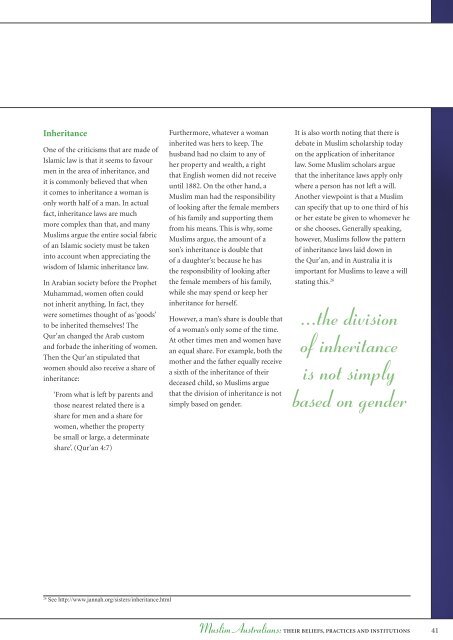Muslim Australians - Religion Cultural Diversity Resource Manual
http://www.islamicglobe.com
http://www.islamicglobe.com
Create successful ePaper yourself
Turn your PDF publications into a flip-book with our unique Google optimized e-Paper software.
Inheritance<br />
One of the criticisms that are made of<br />
Islamic law is that it seems to favour<br />
men in the area of inheritance, and<br />
it is commonly believed that when<br />
it comes to inheritance a woman is<br />
only worth half of a man. In actual<br />
fact, inheritance laws are much<br />
more complex than that, and many<br />
<strong>Muslim</strong>s argue the entire social fabric<br />
of an Islamic society must be taken<br />
into account when appreciating the<br />
wisdom of Islamic inheritance law.<br />
In Arabian society before the Prophet<br />
Muhammad, women often could<br />
not inherit anything. In fact, they<br />
were sometimes thought of as ‘goods’<br />
to be inherited themselves! The<br />
Qur’an changed the Arab custom<br />
and forbade the inheriting of women.<br />
Then the Qur’an stipulated that<br />
women should also receive a share of<br />
inheritance:<br />
‘From what is left by parents and<br />
those nearest related there is a<br />
share for men and a share for<br />
women, whether the property<br />
be small or large, a determinate<br />
share’. (Qur’an 4:7)<br />
Furthermore, whatever a woman<br />
inherited was hers to keep. The<br />
husband had no claim to any of<br />
her property and wealth, a right<br />
that English women did not receive<br />
until 1882. On the other hand, a<br />
<strong>Muslim</strong> man had the responsibility<br />
of looking after the female members<br />
of his family and supporting them<br />
from his means. This is why, some<br />
<strong>Muslim</strong>s argue, the amount of a<br />
son’s inheritance is double that<br />
of a daughter’s: because he has<br />
the responsibility of looking after<br />
the female members of his family,<br />
while she may spend or keep her<br />
inheritance for herself.<br />
However, a man’s share is double that<br />
of a woman’s only some of the time.<br />
At other times men and women have<br />
an equal share. For example, both the<br />
mother and the father equally receive<br />
a sixth of the inheritance of their<br />
deceased child, so <strong>Muslim</strong>s argue<br />
that the division of inheritance is not<br />
simply based on gender.<br />
It is also worth noting that there is<br />
debate in <strong>Muslim</strong> scholarship today<br />
on the application of inheritance<br />
law. Some <strong>Muslim</strong> scholars argue<br />
that the inheritance laws apply only<br />
where a person has not left a will.<br />
Another viewpoint is that a <strong>Muslim</strong><br />
can specify that up to one third of his<br />
or her estate be given to whomever he<br />
or she chooses. Generally speaking,<br />
however, <strong>Muslim</strong>s follow the pattern<br />
of inheritance laws laid down in<br />
the Qur’an, and in Australia it is<br />
important for <strong>Muslim</strong>s to leave a will<br />
stating this. 26<br />
...the division<br />
of inheritance<br />
is not simply<br />
based on gender<br />
26<br />
See http://www.jannah.org/sisters/inheritance.html<br />
<strong>Muslim</strong> <strong>Australians</strong>:THEIR BELIEFS, PRACTICES AND INSTITUTIONS 41














